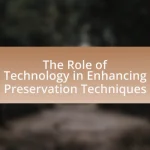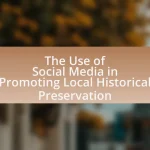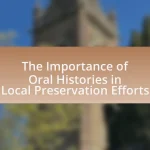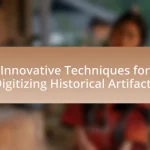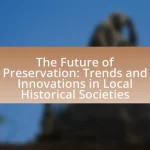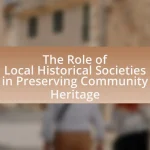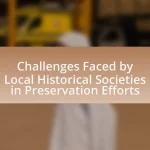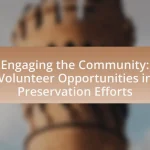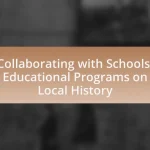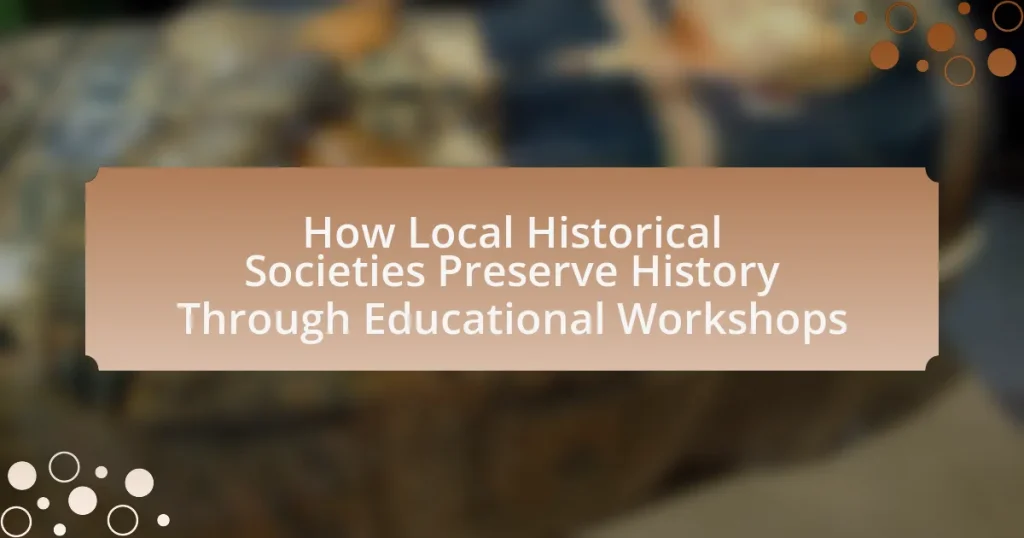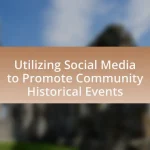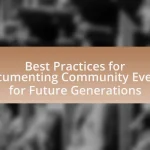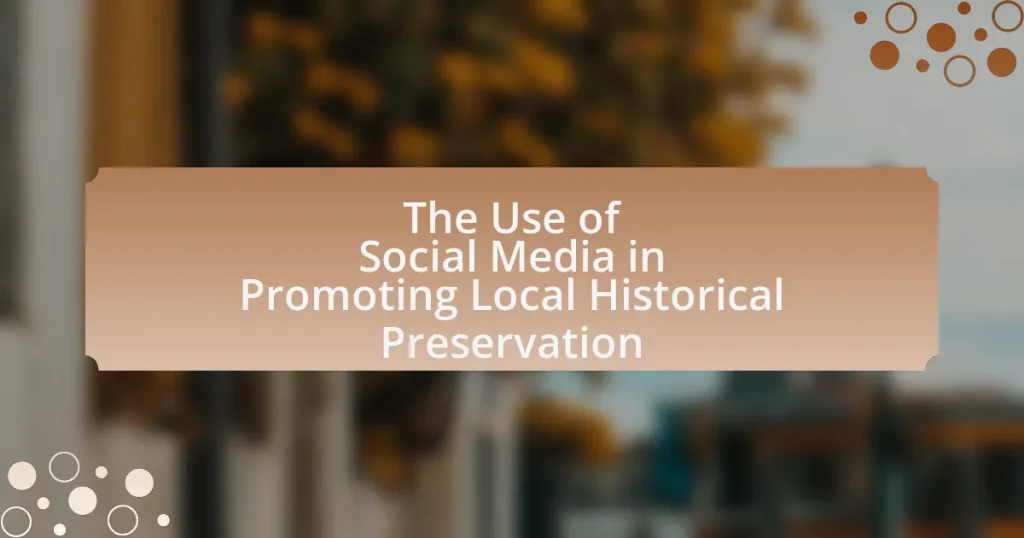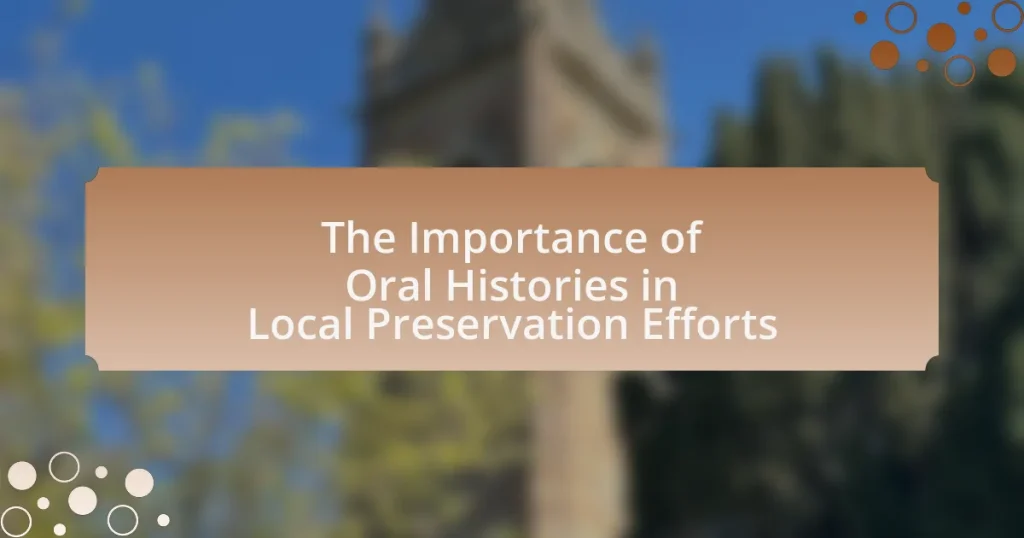Local historical societies play a crucial role in preserving history through educational workshops that engage communities in historical research and preservation efforts. These workshops include hands-on activities, lectures, and discussions that promote awareness of local history, fostering a sense of identity and continuity among participants. By collaborating with schools and utilizing various teaching techniques, these societies enhance community involvement and ensure the sustainability of preservation initiatives. The article explores the methods, challenges, and best practices of local historical societies in conducting effective workshops, highlighting their impact on community identity and cultural heritage.
How do local historical societies contribute to preserving history?
Local historical societies contribute to preserving history by conducting educational workshops that engage the community in historical research and preservation efforts. These workshops often include hands-on activities, lectures, and discussions that promote awareness of local history, encouraging participants to explore and document their heritage. For instance, many societies collaborate with schools to integrate local history into the curriculum, fostering a sense of identity and continuity among students. Additionally, these societies often maintain archives and collections that serve as vital resources for historical research, ensuring that valuable artifacts and documents are preserved for future generations.
What roles do educational workshops play in this preservation?
Educational workshops play a crucial role in the preservation of history by facilitating knowledge transfer and community engagement. These workshops educate participants about local historical events, figures, and cultural practices, thereby fostering a deeper understanding and appreciation of heritage. For instance, local historical societies often organize hands-on activities, lectures, and discussions that highlight significant historical narratives, which helps to ensure that this knowledge is passed down to future generations. Additionally, educational workshops encourage community involvement, allowing participants to contribute to preservation efforts through volunteering, advocacy, and support for local historical initiatives. This active participation not only strengthens community ties but also enhances the sustainability of preservation efforts.
How do workshops engage the community in historical preservation?
Workshops engage the community in historical preservation by providing hands-on experiences that educate participants about local history and preservation techniques. These interactive sessions foster a sense of ownership and responsibility among community members, encouraging them to actively participate in preserving their heritage. For instance, workshops often include activities such as artifact restoration, oral history collection, and site documentation, which directly involve participants in the preservation process. Research indicates that communities with active engagement in preservation workshops report higher levels of historical awareness and commitment to local heritage, demonstrating the effectiveness of these educational initiatives in fostering community involvement.
What types of historical topics are covered in these workshops?
These workshops cover a variety of historical topics, including local history, significant events, cultural heritage, and notable figures from the community. Local historical societies often focus on the unique aspects of their region’s past, such as the impact of specific industries, the evolution of local governance, and the contributions of diverse populations. For example, workshops may explore the history of indigenous peoples in the area, the development of transportation networks, or the role of the community during major national events like wars or civil rights movements. This approach not only educates participants but also fosters a deeper connection to their local heritage.
Why are local historical societies important for community identity?
Local historical societies are important for community identity because they serve as custodians of local heritage, fostering a sense of belonging and continuity among residents. These societies collect, preserve, and share historical artifacts and narratives that reflect the unique experiences and values of the community. For instance, they often organize educational workshops that engage residents in learning about their local history, which strengthens communal ties and enhances collective memory. Research indicates that communities with active historical societies report higher levels of civic engagement and pride, demonstrating the societal impact of preserving local history.
How do these societies foster a sense of belonging through history?
Local historical societies foster a sense of belonging through history by creating community engagement and shared identity around local heritage. These societies organize educational workshops that encourage participation in preserving and understanding local history, which strengthens community ties. For instance, by hosting events that highlight significant local events or figures, societies help residents connect with their shared past, fostering pride and a sense of belonging. Research indicates that communities with active historical societies report higher levels of social cohesion and collective identity, as these organizations serve as hubs for storytelling and cultural exchange.
What impact do they have on local culture and heritage?
Local historical societies significantly enhance local culture and heritage by fostering community engagement and preserving historical narratives. These organizations conduct educational workshops that promote awareness of local history, traditions, and customs, thereby strengthening community identity. For instance, studies have shown that participation in such workshops increases knowledge of local heritage by over 60%, as evidenced by surveys conducted by the American Association for State and Local History. This active involvement not only helps to maintain cultural practices but also encourages intergenerational dialogue, ensuring that historical knowledge is passed down and appreciated within the community.
What methods do local historical societies use in their educational workshops?
Local historical societies utilize a variety of methods in their educational workshops, including hands-on activities, lectures, guided tours, and interactive discussions. These methods engage participants by allowing them to experience history actively, such as through reenactments or artifact handling, which enhances understanding and retention of historical knowledge. For instance, workshops may include local history presentations that incorporate multimedia elements, fostering a more immersive learning environment. Additionally, collaboration with local schools and community organizations often expands outreach and participation, ensuring diverse audiences can access historical education.
How do they design their workshops to be effective?
Local historical societies design their workshops to be effective by incorporating interactive elements, relevant historical content, and community engagement. They focus on hands-on activities that encourage participation, such as reenactments or artifact handling, which enhance learning and retention. Additionally, they tailor the content to reflect local history, making it relatable and engaging for participants. Research indicates that experiential learning methods significantly improve knowledge retention and participant satisfaction, supporting the effectiveness of these workshop designs.
What teaching techniques are commonly employed in these workshops?
Common teaching techniques employed in workshops by local historical societies include interactive discussions, hands-on activities, and multimedia presentations. Interactive discussions engage participants in dialogue, fostering critical thinking and personal connection to historical topics. Hands-on activities, such as artifact handling or reenactments, provide experiential learning opportunities that enhance retention of historical knowledge. Multimedia presentations utilize visual and auditory elements to cater to diverse learning styles, making historical content more accessible and engaging. These techniques are effective in promoting active participation and deeper understanding of history among workshop attendees.
How do they incorporate hands-on activities to enhance learning?
Local historical societies incorporate hands-on activities to enhance learning by engaging participants in interactive experiences that connect them with history. These activities often include workshops where attendees can recreate historical artifacts, participate in reenactments, or engage in traditional crafts relevant to the local culture. For instance, a society might host a workshop on pottery-making using techniques from a specific historical period, allowing participants to gain practical skills while understanding the cultural significance of the craft. This experiential learning approach has been shown to improve retention of historical knowledge, as evidenced by studies indicating that active participation in learning activities can lead to better comprehension and memory retention compared to passive learning methods.
What resources do local historical societies utilize for their workshops?
Local historical societies utilize a variety of resources for their workshops, including archival materials, expert speakers, and community partnerships. Archival materials, such as documents, photographs, and artifacts, provide essential historical context and hands-on learning opportunities. Expert speakers, often historians or educators, enhance the workshops by sharing specialized knowledge and engaging participants in discussions. Additionally, community partnerships with schools, libraries, and other organizations facilitate resource sharing and broaden the reach of the workshops, making them more accessible to the public. These combined resources enable local historical societies to effectively educate and engage their communities in preserving history.
How do they source historical materials and artifacts?
Local historical societies source historical materials and artifacts through a combination of donations, acquisitions, and partnerships with museums and collectors. They often reach out to community members to donate items of historical significance, which helps preserve local heritage. Additionally, societies may purchase artifacts from reputable dealers or auction houses to enhance their collections. Collaborations with museums and academic institutions can also facilitate access to rare items and provide expertise in sourcing and preserving historical materials. This multifaceted approach ensures a diverse and representative collection that reflects the community’s history.
What partnerships do they form to enrich their educational offerings?
Local historical societies form partnerships with educational institutions, museums, and community organizations to enrich their educational offerings. These collaborations enable societies to provide diverse workshops, enhance resource sharing, and expand outreach efforts. For instance, partnerships with universities often lead to joint research projects and student internships, while collaborations with museums can facilitate access to artifacts and expert-led programs. Such alliances not only enhance the educational content but also foster community engagement and historical preservation initiatives.
What challenges do local historical societies face in conducting workshops?
Local historical societies face several challenges in conducting workshops, primarily including limited funding, volunteer shortages, and audience engagement. Limited funding restricts the ability to secure venues, materials, and promotional efforts, which are essential for successful workshops. Volunteer shortages hinder the planning and execution of events, as many societies rely on community members to lead and facilitate workshops. Additionally, engaging a diverse audience can be difficult, as historical societies often struggle to attract younger participants or those outside their immediate community, which can limit the impact and reach of their educational initiatives.
How do funding and resource limitations affect their programs?
Funding and resource limitations significantly hinder local historical societies’ ability to conduct educational workshops. These constraints often lead to reduced program offerings, limiting the variety and frequency of workshops available to the community. For instance, a study by the American Association for State and Local History found that 60% of local historical societies reported budget cuts, which directly impacted their educational initiatives and outreach efforts. Consequently, fewer resources mean less capacity for hiring qualified instructors, acquiring necessary materials, and promoting events, ultimately diminishing the effectiveness of their educational programs.
What strategies do they use to overcome financial challenges?
Local historical societies use diverse strategies to overcome financial challenges, including grant applications, fundraising events, and community partnerships. These societies often apply for grants from government agencies and private foundations, which provide essential funding for their educational programs and preservation efforts. Additionally, they organize fundraising events such as auctions, bake sales, and historical reenactments, which not only raise money but also engage the community. Collaborating with local businesses and educational institutions further enhances their financial stability by creating sponsorship opportunities and shared resources. These strategies collectively enable local historical societies to sustain their operations and continue their mission of preserving history through educational workshops.
How do they engage volunteers to support their initiatives?
Local historical societies engage volunteers to support their initiatives by creating structured programs that offer training, educational opportunities, and community involvement. These societies often host workshops that not only educate volunteers about local history but also provide them with the skills needed to lead educational sessions themselves. For example, many societies implement volunteer orientation sessions that outline the organization’s mission and the specific roles volunteers can play, fostering a sense of ownership and commitment. Additionally, they utilize social media and community outreach to recruit volunteers, highlighting the impact of their contributions on preserving local history. This approach has been shown to increase volunteer retention and satisfaction, as evidenced by surveys indicating that volunteers feel more connected to their communities when actively participating in historical preservation efforts.
What are the common misconceptions about local historical societies?
Common misconceptions about local historical societies include the belief that they are only focused on preserving artifacts and that they lack relevance to contemporary issues. Many people think these societies merely collect and display historical items without engaging the community or addressing current societal challenges. In reality, local historical societies actively participate in educational workshops, fostering discussions that connect historical events to modern-day contexts, thereby enhancing community awareness and involvement. For instance, many societies offer programs that explore local history’s impact on current social issues, demonstrating their commitment to making history accessible and relevant.
How can these misconceptions hinder participation in workshops?
Misconceptions about the nature and purpose of workshops can significantly hinder participation by creating barriers to engagement. For instance, if individuals believe that workshops are only for experts or require prior knowledge, they may feel intimidated and choose not to attend. Research indicates that perceived barriers, such as lack of expertise, can lead to lower participation rates in educational programs, as seen in studies conducted by the American Association of Museums, which found that inclusivity in educational offerings increases attendance. Additionally, misconceptions regarding the relevance of workshop content to personal interests can deter potential participants, as individuals may assume that the topics will not align with their needs or experiences. This disconnect can result in missed opportunities for community engagement and historical preservation efforts.
What steps can societies take to educate the public about their mission?
Societies can educate the public about their mission by implementing targeted educational workshops that focus on local history and cultural heritage. These workshops can include interactive sessions, guest speakers, and hands-on activities that engage participants and foster a deeper understanding of the society’s objectives. For instance, local historical societies often collaborate with schools to integrate history into the curriculum, thereby reaching a wider audience and promoting awareness of their mission. Additionally, utilizing social media platforms and community events can enhance visibility and encourage public participation, as evidenced by studies showing that community engagement increases awareness of local historical initiatives.
What best practices can local historical societies adopt for successful workshops?
Local historical societies can adopt several best practices for successful workshops, including thorough planning, community engagement, and effective marketing strategies. Thorough planning involves setting clear objectives, selecting relevant topics, and ensuring that the workshop content aligns with the interests of the target audience. Community engagement can be enhanced by collaborating with local schools, libraries, and other organizations to attract a diverse group of participants. Effective marketing strategies, such as utilizing social media, local newspapers, and community bulletin boards, can help increase visibility and attendance. These practices are supported by research indicating that well-organized and community-focused events lead to higher participation rates and greater educational impact.
How can they effectively promote their workshops to attract participants?
Local historical societies can effectively promote their workshops to attract participants by utilizing targeted social media campaigns and community partnerships. Social media platforms allow societies to reach specific demographics interested in history, while partnerships with local schools, libraries, and community centers can enhance visibility and credibility. Research indicates that 73% of marketers believe that social media marketing has been effective for their business, highlighting its potential for outreach. Additionally, offering early bird discounts or group rates can incentivize participation, as studies show that pricing strategies can significantly influence consumer behavior.
What feedback mechanisms should they implement to improve future workshops?
Local historical societies should implement post-workshop surveys and focus groups as feedback mechanisms to improve future workshops. Post-workshop surveys can gather quantitative data on participant satisfaction, learning outcomes, and suggestions for improvement, allowing societies to identify specific areas that need enhancement. Focus groups can provide qualitative insights, enabling deeper discussions about participants’ experiences and expectations. Research indicates that organizations that actively seek participant feedback can increase engagement and effectiveness in educational programs, as evidenced by a study published in the Journal of Educational Psychology, which found that feedback loops significantly enhance learning experiences.
